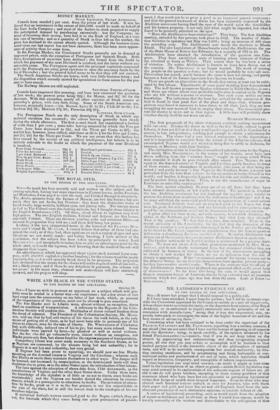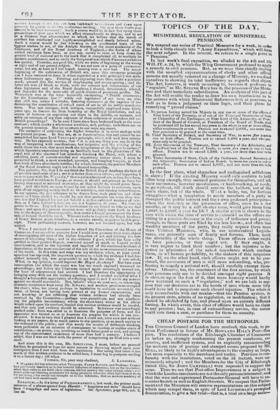MR. LANDSEER'S EVIDENCE ON ART.
TO THE EDITOR OF THE SPECTATOR.
SIR—It seems but proper that I should respond to a public call. If I have been mistaken, I must hope for pardon ; but I did by no means con- sider the Committee appointed by the Commons merely as a jury ere inquir,
whose object was to ascertain the sanity, or the departure from reason, of the Royal Academy, or as authorized to inquire exclusively into the principles of art in connexion with manufactures," seeing that it was also empowered, nay, ex- pressly instructed, to investigate the state of the higher branches of art and the best means of advancing them."
Concerning what has been ordained to be done under the supervisal of Sir FRANCIS CHANTREY and Mr. PAPWORTII, regarding it as is solitary measure, I am afraid (but am not sure) that I have nut the honour of agreeing in all respects with the Spectator; being, to speak candidly, of the opinion advanced by his friend PHILOGRAPHICUS,—namely, that if you do not keep talent on the stretch by appreciating and remunerating, and thus invigorating original genius, all else that you may ordain ur accomplish will be fruitless to that exalted purpose which is the ostensible object of the philosophers of national taste, and will in its inevitable consequences but nourish mediocrity, by dilu- ting existing excellence, and by perpetuating and fixing fashionable or con- ventional modes and productions of art and of taste, which legislation should regard as transitive, temporary, and susceptible of infinite improvement.
Unless legislation can urge mind onward,—as surely it might at least raise itself to the contemplation of an object so grand,—unless British legislation can urge mind onward in its explorations of the unknown regions of future art, all else it can do will prove bootless, excepting to those money-grubbers of this mammon island who have been but too successful iu persuading legislatorial virtue that heaps of wealth were heaps of happiness. Even let those who may cherish such heretical notions embark at once for America, take with therm their paper and gold, and leave fine art and old England. freed from the mis- chievous prevalence of such obstructive opinions, to emulate Athens of old. A course of legislatorial proceeding, such as would result from the adoption of errors so barbarous and so obvious as those I would here expose, would be tot ally turn pally of the wisdom and discreditable to the self-opinion of that
up erg Th 'el, I (it been backward to 1,..iferate end draw upon po..4.1 try Le ft:-e 4.1 uvellectuel striding. (tit that the drafts may deserve to be duly honoured ! such a course would be in fact but aping those proceedings of pest age.. alSeli we affect triumphantly to despise, nd to set at a distance that Advancement to which we believe that the march of intellect has conducted our highiy.accomplished And dearly beloved selves. Such a course would be but following in the condemned train of the hagone traders in art, of the Adelphi Society, of the court academies of the Continent, and of the Royal Academy of England,—the fruits of whose waited exertions have been, as you say, merely to raise or keep down the general level of national art to the mark that is complained of, to multiply its modern practitioners, and to verify the Scriptural text which PolLOURAPHICUS has quoted. Consider, any good Sir, while we write of beginning at the wrong or right end of our present subject. We are not now at a point of commence.
ment, but are, at least as I had hoped, turning over a new leaf. The actual beginning of the cultivation of British art, upon this erroneous principle (as I have ventured to deem it when regarded as a sole principle) was made some half-century ago. Painting and engraving were then, under a patriotic mask, pressed into the service of eltopkeeping and money-getting ; and the latter art was (I blush to think, with the consent and countenance of our then legislators and of the Royal Academy,) abused, deteriorated, diluted, and degraded for the mere sake of quick returns of pecuniary profits. Mr. Wiennest was at the time heroically exclaiming, " Perish commerce; let the Constitution live !" while our legislators of art were, as, alas, they still are, unless I mistake, fostering commerce at the expense of un- dermining the constitution of art—I mean of art in all its nobler manifesta- tions. Was not intrigue, dank intrigue, successfully employed some thirty years ago, to dismiss nie from lecturing at the Royal Institution, nod my course of lectures on engraving cut short in the middle, on account, and solely on account, of my then exposure of these nefarious or mistaken and un- British proceedings? To be sure I have since been beckoned back to the mule rostrum ; which marks a wholesome revulsion, and, perhaps, emboldens me on the present occasion. But let us return to our main argument.
The metaphor of cultivating the higher branches is in strict analogy with our present purpose. In fine art, as in forest culture, this end cannot be ac- complished but upon Lott! VERCLAM'S principle, Odell will well bear reitera- tion. He Las expressly written, that 6' it is not any thing you can do in the way of tampering with ramification,.' but irrigation and the stirring of the earth about the root, that must work the invigoration of the higher branches';" which figurative expressions bring us familiarly back to the plantation of the royal tree of the renowned but mistaken GEORGIC the Third, with whom a caballing junta of narrow-minded and unpatriotic artists made, I must be permitted to think, a most wretched, ignorant, and bungling bargain, as their first book of laws abundantly testifies; ror which, however, the present Members of the Royal Academy ought not to be deemed responsible. You perceive, Sir, that I do not think the British Royal Academy the best of all possible academies of art ; yet it is better than some others; and supposing I were +.0 agree with Dr. W A ACE N, • that royal academies of art, as they /wee been, have proved worthless to Europe. or worse, it should not prevent us from be- lieving that royal or national academies, as they be, would prove benc- cial. And this faith we seem bound by our social feelings to entertain, upon pain of our supposing society itself to be worthless, and turning misanthropes. In my opinion, the pi-t inference to be drawn front such premises and state- ments as I have allud.,1 to, stimuli be, not that academies are worse than use- less, but that England lets not yet beheld a testi-cr.:Istituto! academy of arts. But, as I have noticed b, fore, we arc not beginning de now. We have no power to do so. England and its institutions we are bound to rake as we find them ; and upon the present occasion none will probably start forth in hosti. lity to the dogma of MONT ESCX L EC, that under a kingly government the (nun- tain of honour should be royal. Whoever seeks to improve the Royal Academy of Great Britain must, therefore, to a certain extent, acpriesee in this prin• eaple. These preliminary matters, however, are not insisted upon, but sub- mitted.
When I received the summons to attend the Committee of the House of Commute, I set itself to consider how I could best pretnote their main object of investigating the state of the higher branches of at t, and devising the hest means of advanciug them ; and in the evidence I gave, which has berm sadly garbled in their printed Report, restricted myself as much as I could to this consideration, and to the injustice and impolicy of the continued academical degradation of the most commercial of the arts in the most commercial military of the world. In this state and stage was my evidence, when, as your cones spondent has reported, the important question to which the evidence I had fur- nished naturally led, was propounded to me from the chair. I was asked, What, in my opinion, would improve the Royal Academy? But here some interruption (to which the court was but too much exposed) traversed its proceedings; and before the Chairman turned again resumingly tuward me, the hour of adjournment had arrived. I had therefore the opportunity of bringing away with me the written question ; and I availed myself of what I thought a favourable opportunity of reflecting upon it, and I wrote my answer against we should reassemble. But, behold ! when we next met, an interesting domestic occurrence kept away Mr. EwaRT, and another gentleman occupied the chair ; who, too young perhaps in legislation to estimate accurately the value of forms, not having been present at my former examination, and not knowing or not reflecting that written evidence had already been received by the Committee—perhaps over-punctilious, and not recollect. ing the palpable inconsistency which the short-hand writer at his elbow would reflect upon his conduct, fancied that written evidence would be invalid, and that only oral evidence should be admitted. Relevance was accordingly pushed aside : form was called in to frustrate the purposes of form, and the apparatus was turned so as to frustrate the purpose for which it was eon- 'meted. It was in vain that I pleaded that I could not, viva voce and without looking at my papers, do so much justice to the question, or so much service to the tribunal or the public ; and that surely the results of deliberate thinking were preferable on an occasion of consequence to random or sudden starts of recollection,—on points, too, involving so much future good or evil, and arising out of the concatenated experience of mote than half a century. I believe I added, that I was not blest with the power of compressing an Iliad into a nut- shell.
And since this is the case, Mr. SPECTATOR, I must, before we proceed further, be permitted to hope for more success in throwing myself upon .your indulgence than I met with from the legislators. But seeing that there /1,1 too much of this written evidence to be added here, I must beg to postpone sending it to a future day ; till when 1 remain, Sir, your very obedient, J. L ANDSE ER.
• WA•GIN did but reiterate what VO1.T•1111. PAYNI KNIGHT, and Professor FUSICLI
had previously asserted as to the baneful influence of academies ; but as the tau latter. wheu they came to set forth their reasons.did but destroy the value °leach other's evi- dence.(the one blaming academies for doing precisely what the other had blamed them for nut doing.) the result but brought us to the inference, that no modern academy of art had been well constituted.
Ea RAT C et.—In the letter of PH/LOGRAPHICCS, last week, the printer made nonsense of a.phrase quoted from Hamlet : " happiness and suits ' should have been " (rapport and suits of legislation." See Spectator, page 981, cul. 2, fine 40.



























 Previous page
Previous page